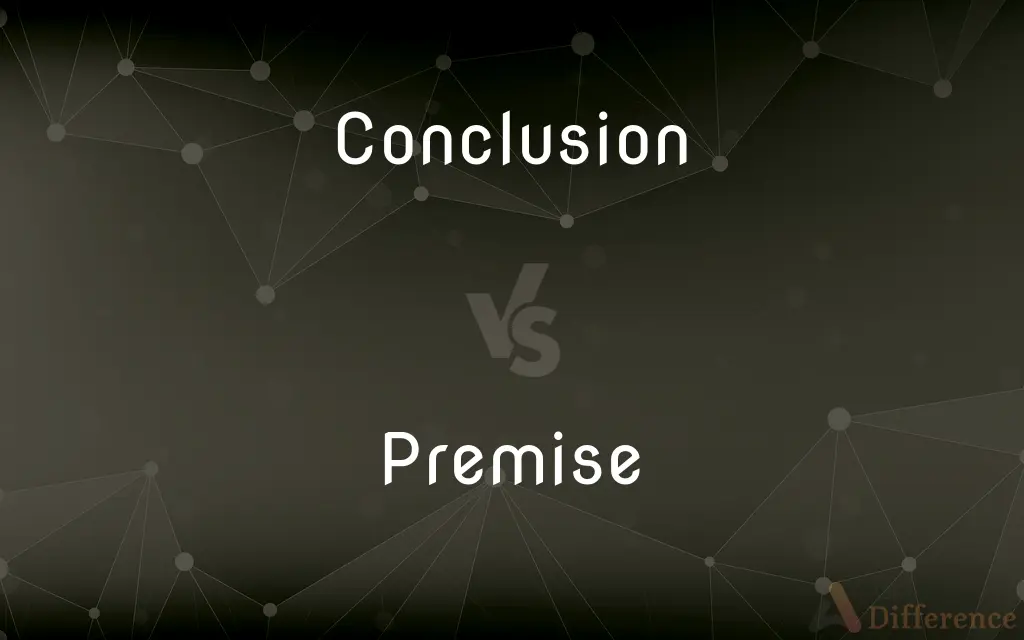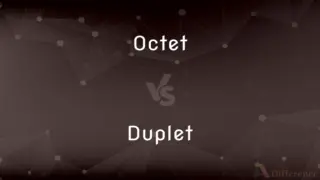Conclusion vs. Premise — What's the Difference?
A conclusion is the result or judgment derived from reasoning or argumentation, while a premise is a statement or proposition that forms the basis for a conclusion.

Difference Between Conclusion and Premise
Table of Contents
ADVERTISEMENT
Key Differences
A conclusion is the end point of an argument where the outcome or judgment is presented, based on the premises provided. It is what the argument aims to prove or suggest. On the other hand, a premise is the foundational statement or assumption that supports the conclusion. It is taken to be true for the purposes of the argument.
Conclusions are derived after considering the premises and applying logical reasoning. They serve as the argument's final claim or assertion. Whereas, premises are presented at the beginning of an argument as the basic facts or assertions that justify the conclusion.
In logical structure, the conclusion is the statement that is being supported by the premises. It is the assertion that the argument attempts to demonstrate as true. Conversely, a premise acts as the supporting evidence for the conclusion, providing the reasons or basis for accepting the conclusion as true.
The validity of a conclusion heavily depends on the strength and truthfulness of its premises. If the premises are faulty or untrue, the conclusion may be invalid or weak. Meanwhile, strong, clear, and true premises contribute to a robust and persuasive conclusion.
Conclusions often require careful interpretation and critical thinking to understand their implications fully. They are the “so what” of the argument, offering insights or decisions. Premises, however, are generally straightforward statements or accepted facts that require less interpretation but are crucial for building the argument.
ADVERTISEMENT
Comparison Chart
Definition
The judgment or decision reached by reasoning
A statement or proposition that supports a conclusion
Role in Argument
Serves as the argument's endpoint or claim
Acts as the foundational support for the conclusion
Logical Position
Derived from premises
Precedes and supports the conclusion
Importance
Indicates the argument’s final stance or perspective
Provides the necessary evidence for the conclusion
Dependence
Relies on the strength and truth of premises
Independent; acts as a starting point of reasoning
Compare with Definitions
Conclusion
A final decision reached by reasoning.
After much debate, the jury reached a conclusion.
Premise
A proposition used as evidence in an argument.
The scientist started with the premise that all life requires water.
Conclusion
The outcome of an argument or process.
The conclusion of their discussion was surprisingly positive.
Premise
The starting point of an argument or theory.
The premise behind the policy change was well-intentioned.
Conclusion
A judgment or decision reached by reasoning.
The detective’s conclusion was based on the evidence presented.
Premise
The basis for a conclusion.
His argument had a solid premise but lacked convincing evidence.
Conclusion
The last part of something.
The conclusion of the book left readers wanting more.
Premise
An assumption that something is true.
The debate was based on the premise that climate change is not influenced by human activity.
Conclusion
The end or finish of an event or process.
The conclusion of the ceremony was marked by applause.
Premise
A statement or idea that is accepted as being true.
The premise of her thesis was controversial.
Conclusion
The close or last part; the end or finish
The conclusion of the festivities.
Premise
A premise or premiss is a statement that an argument claims will induce or justify a conclusion. It is an assumption that something is true.
Conclusion
The result or outcome of an act or process
What was the conclusion of all these efforts?.
Premise
A proposition upon which an argument is based or from which a conclusion is drawn.
Conclusion
A judgment or decision reached after deliberation.
Premise
One of the propositions in a deductive argument.
Conclusion
A final arrangement or settlement, as of a treaty.
Premise
Either the major or the minor proposition of a syllogism, from which the conclusion is drawn.
Conclusion
(Law) The formal closing of a legal complaint or pleading.
Premise
Land, the buildings on it, or both the land and the buildings on it.
Conclusion
A proposition that follows from the premises of a formal proof, for instance from the major and minor premises of a syllogism.
Premise
A building or particular portion of a building.
Conclusion
The proposition concluded from one or more premises; a deduction.
Premise
(Law) The part of a deed that states the details of the conveyance of the property.
Conclusion
The end, finish, close or last part of something.
Premise
To provide a basis for; base
"The American Revolution had been premised on a tacit bargain that regional conflicts would be subordinated to the need for unity among the states" (Ron Chernow).
Conclusion
The outcome or result of a process or act.
Premise
To state or assume as a proposition in an argument.
Conclusion
A decision reached after careful thought.
The board has come to the conclusion that the proposed takeover would not be in the interest of our shareholders.
Premise
To state in advance as an introduction or explanation.
Conclusion
(logic) In an argument or syllogism, the proposition that follows as a necessary consequence of the premises.
Premise
A proposition antecedently supposed or proved; something previously stated or assumed as the basis of further argument; a condition; a supposition.
Conclusion
(obsolete) An experiment, or something from which a conclusion may be drawn.
Premise
(logic) Any of the first propositions of a syllogism, from which the conclusion is deduced.
Conclusion
(law) The end or close of a pleading, for example, the formal ending of an indictment, "against the peace", etc.
Premise
Matters previously stated or set forth; especially, that part in the beginning of a deed, the office of which is to express the grantor and grantee, and the land or thing granted or conveyed, and all that precedes the habendum; the thing demised or granted.
Conclusion
(law) An estoppel or bar by which a person is held to a particular position.
Premise
A piece of real estate; a building and its adjuncts.
Trespass on another’s premises
Conclusion
The last part of anything; close; termination; end.
A fluorish of trumpets announced the conclusion of the contest.
Premise
(authorship) The fundamental concept that drives the plot of a film or other story.
Conclusion
Final decision; determination; result.
And the conclusion is, she shall be thine.
Premise
To state or assume something as a proposition to an argument.
Conclusion
Any inference or result of reasoning.
Premise
To make a premise.
Conclusion
The inferred proposition of a syllogism; the necessary consequence of the conditions asserted in two related propositions called premises. See Syllogism.
He granted him both the major and minor, but denied him the conclusion.
Premise
To set forth beforehand, or as introductory to the main subject; to offer previously, as something to explain or aid in understanding what follows.
Conclusion
Drawing of inferences.
Your wife Octavia, with her modest eyesAnd still conclusion.
Premise
To send before the time, or beforehand; hence, to cause to be before something else; to employ previously.
Conclusion
An experiment, or something from which a conclusion may be drawn.
We practice likewise all conclusions of grafting and inoculating.
Premise
A proposition antecedently supposed or proved; something previously stated or assumed as the basis of further argument; a condition; a supposition.
The premises observed,Thy will by my performance shall be served.
Conclusion
The end or close of a pleading, e.g., the formal ending of an indictment, "against the peace," etc.
Like the famous ape,To try conclusions, in the basket creep.
Premise
Either of the first two propositions of a syllogism, from which the conclusion is drawn.
While the premises stand firm, it is impossible to shake the conclusion.
Conclusion
A position or opinion or judgment reached after consideration;
A decision unfavorable to the opposition
His conclusion took the evidence into account
Satisfied with the panel's determination
Premise
Matters previously stated or set forth; esp., that part in the beginning of a deed, the office of which is to express the grantor and grantee, and the land or thing granted or conveyed, and all that precedes the habendum; the thing demised or granted.
Conclusion
An intuitive assumption;
Jump to a conclusion
Premise
A piece of real estate; a building and its adjuncts; as, to lease premises; to trespass on another's premises.
Conclusion
The temporal end; the concluding time;
The stopping point of each round was signaled by a bell
The market was up at the finish
They were playing better at the close of the season
Premise
To send before the time, or beforehand; hence, to cause to be before something else; to employ previously.
The premised flames of the last day.
If venesection and a cathartic be premised.
Conclusion
Event whose occurrence ends something;
His death marked the ending of an era
When these final episodes are broadcast it will be the finish of the show
Premise
To set forth beforehand, or as introductory to the main subject; to offer previously, as something to explain or aid in understanding what follows; especially, to lay down premises or first propositions, on which rest the subsequent reasonings.
I premise these particulars that the reader may know that I enter upon it as a very ungrateful task.
Conclusion
The proposition arrived at by logical reasoning (such as the proposition that must follow from the major and minor premises of a syllogism)
Premise
To make a premise; to set forth something as a premise.
Conclusion
The act of ending something;
The termination of the agreement
Premise
A statement that is assumed to be true and from which a conclusion can be drawn;
On the assumption that he has been injured we can infer that he will not to play
Conclusion
A final settlement;
The conclusion of a business deal
The conclusion of the peace treaty
Premise
Set forth beforehand, often as an explanation;
He premised these remarks so that his readers might understand
Conclusion
The last section of a communication;
In conclusion I want to say...
Premise
Furnish with a preface or introduction;
She always precedes her lectures with a joke
He prefaced his lecture with a critical remark about the institution
Conclusion
The act of making up your mind about something;
The burden of decision was his
He drew his conclusions quickly
Premise
Take something as preexisting and given
Common Curiosities
How does a conclusion differ from a premise?
A conclusion is the outcome of reasoning, while a premise is the starting point that provides the basis for that reasoning.
Is a conclusion always true?
A conclusion is not always true; its truthfulness depends on the validity of the premises and the soundness of the reasoning.
How do you identify a conclusion in an argument?
A conclusion is typically signaled by words like "therefore," "thus," or "hence," indicating the end of the argument.
How can premises affect the strength of an argument?
Strong, credible premises make for a compelling argument, while weak or false premises undermine it.
What is a premise?
A premise is a foundational statement or proposition that supports and leads to a conclusion in an argument.
How many premises are needed to support a conclusion?
There is no fixed number; an argument can have one or several premises supporting a conclusion.
Can an argument have multiple conclusions?
Typically, an argument aims at one main conclusion, but it may have intermediate conclusions leading to the final one.
Why is it important to distinguish between conclusion and premise?
Distinguishing between them is crucial for analyzing, constructing, and evaluating arguments correctly.
What is a conclusion?
A conclusion is the final part of an argument, where a judgment or decision is presented based on preceding premises.
Can a premise be false?
Yes, a premise can be false, but this would typically weaken the argument or lead to a false conclusion.
What happens if the premises are true but the conclusion is false?
This indicates a flaw in the argument's logic, suggesting that the reasoning process was invalid.
What makes a strong premise?
A strong premise is clear, relevant, and truthful, providing a solid foundation for the conclusion.
Can the validity of a conclusion be independent of the premises?
No, the validity of a conclusion is directly dependent on the validity and truth of its supporting premises.
Can a conclusion become a premise in another argument?
Yes, a conclusion from one argument can serve as a premise in another argument.
What is the relationship between premises and conclusion in an argument?
Premises provide the support and basis for the conclusion, leading to it through logical reasoning.
Share Your Discovery

Previous Comparison
Chestnut vs. Conker
Next Comparison
Octet vs. Duplet













































